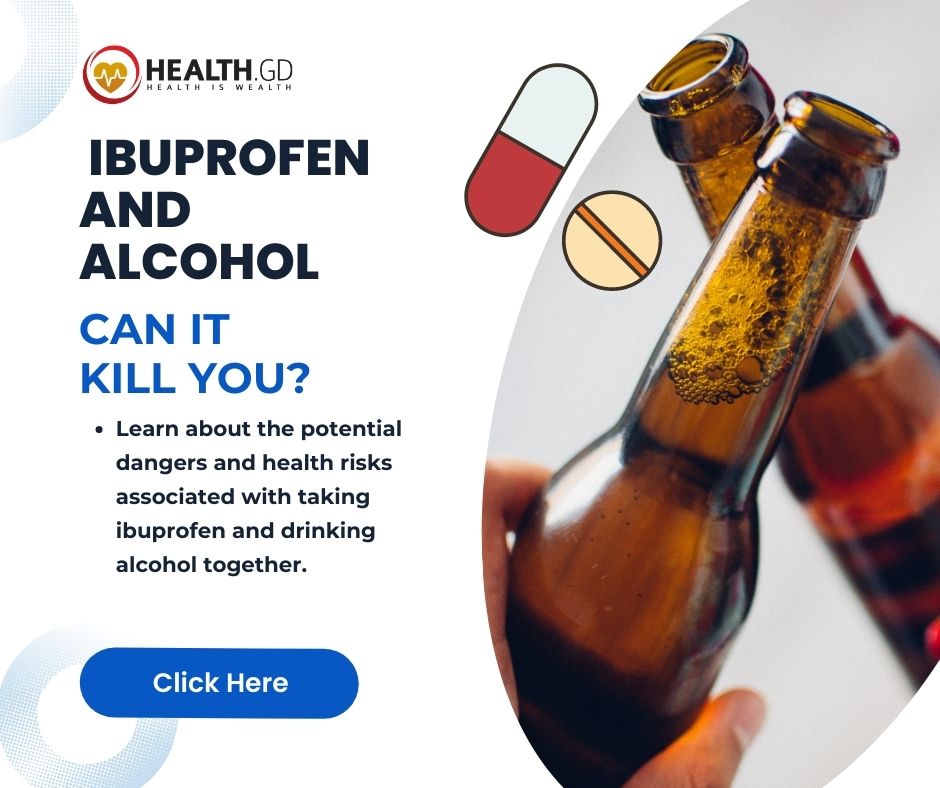Ibuprofen is one of the most used painkillers in the US UK and Canada. It is widely used for its analgesic, antipyretic, and anti-inflammatory properties. People generally use this medication to reduce pain, inflammation, and fever. Ibuprofen is also used to relieve minor aches and pains, such as headaches, toothaches, menstrual cramps, and arthritis. Ibuprofen falls under the category of nonsteroidal anti-inflammatory drugs

The Effect of Alcohol on Your Body
From Ancient days to modern days, alcohol was largely consumed in our society. Drinking alcohol in the limit may not be harmful, but excessive consumption of alcohol may have a significant impact on your health.

In moderate amounts, alcohol can cause relaxation, lowered inhibitions, and impaired coordination. Excessive consumption can lead to intoxication, vomiting, and even alcohol poisoning.
Chronic alcohol consumption can result in a variety of health problems, including liver disease, neurological disorders, and an increased risk of certain cancers.
Mixing ibuprofen and alcohol can lead to several potential health risks.
Why You Should Not Mix Ibuprofen with Alcohol
Mixing ibuprofen and alcohol is not recommended due to the potential health risks and complications that can arise from this combination. They are both capable of irritating the lining of your stomach. Here are the main reasons why you should avoid mixing ibuprofen with alcohol.
1. Gastrointestinal Issues
Both ibuprofen and alcohol can irritate the stomach lining, which may lead to gastritis, stomach ulcers, and gastrointestinal bleeding. When consumed together, the risk of these issues increases, especially with higher doses and prolonged use of both substances.
2. Liver Damage
The liver plays a crucial role in metabolizing both ibuprofen and alcohol. When you consume them together, it can put additional stress on the liver, increasing the risk of liver damage. This risk is even greater in individuals who already have pre-existing liver conditions or a history of heavy alcohol consumption.
3. Increased Risk of Bleeding
Ibuprofen can interfere with blood clotting, while alcohol can thin the blood. Combining these two substances can increase the risk of bleeding, both internally (such as gastrointestinal bleeding) and externally (like from cuts or injuries).
4. Amplified Side Effects

While ibuprofen is generally safe when used as directed, it can cause some side effects, including stomach upset, dizziness, and heartburn. More serious side effects can include gastrointestinal bleeding, kidney problems, and an increased risk of heart attack or stroke. Alcohol can amplify some of the side effects of ibuprofen, such as dizziness, drowsiness, and impaired coordination. This can be particularly dangerous if you’re driving or operating heavy machinery.
5. Potential Overdose
Taking ibuprofen while drinking alcohol may increase the risk of overdose, which can result in severe symptoms like difficulty breathing, seizures, or loss of consciousness. In extreme cases, an overdose can be life-threatening and require immediate medical attention.
6. Reduced Effectiveness of Ibuprofen
Alcohol can potentially reduce the effectiveness of ibuprofen, making it less efficient at reducing pain, inflammation, and fever. This may lead to an increased need for higher doses of ibuprofen, which can further increase the risks associated with combining these substances.
7. Loss of Attention
Mixing Ibuprofen with alcohol can cause drowsiness because both induce physical and mental relaxation. This will also result in slowed reflexes and clouded judgment.
What is the Recommended Dosage of Ibuprofen?
The recommended dosage of ibuprofen can vary depending on various factors such as the age, weight, and medical history of the person taking it. Here We are discussing some of them.
| Sl No | Cause | Age | Doges |
| 1 | Fever | Children 6 months to 2 Years | As recommended by the doctor |
| 2 | Fever | Children over 2 years | As recommended by the doctor |
| 3 | Menstrual cramps | Adults | 300-400 mg every four hours or as recommended by the doctor |
| 4 | Pain Reliever | Adults | 300-400 mg every Six hours or as recommended by the doctor |
| 5 | Osteoarthritis | Adults | 1200 to 3200 mg per day or as recommended by the doctor |
What Are Some Alternatives to Ibuprofen for Pain Relief?
There are several alternatives to ibuprofen for pain relief. Some options include other over-the-counter medications. it’s important to consult with a healthcare professional before starting any new pain management regimen.
Acetaminophen (Paracetamol): An analgesic and antipyretic that can be used to relieve mild to moderate pain and reduce fever. It does not have anti-inflammatory properties like ibuprofen.
Aspirin: A nonsteroidal anti-inflammatory drug (NSAID) that can be used to relieve pain, inflammation, and fever. Aspirin should be used with caution in certain populations, such as children, due to the risk of Reye’s syndrome.
3. Aleve
Aleve is another NSAID that can be used for pain relief.
Conclusion
While ibuprofen and alcohol may not necessarily be lethal when consumed together, the combination can lead to serious health risks and complications. To avoid these dangers, it’s essential to use alternative pain relief methods or medications that carry less risk when consuming alcohol. If you suspect an overdose or experience severe symptoms after combining ibuprofen and alcohol, seek medical help immediately.
Frequently Asked Questions
Can I take ibuprofen after drinking alcohol?
It’s generally best to avoid taking ibuprofen after consuming alcohol, as the combination can increase the risk of gastrointestinal and liver issues. If you need pain relief, consider using acetaminophen or natural methods instead.
How long should I wait after drinking alcohol before taking ibuprofen?
It’s recommended to wait at least six hours after drinking alcohol before taking ibuprofen to minimize potential risks.
Is it safe to take ibuprofen with a small amount of alcohol?
While consuming a small amount of alcohol with ibuprofen may not cause significant issues for some individuals, it’s still best to avoid the combination to prevent potential complications.
Can I take other NSAIDs with alcohol?
Similar to ibuprofen, other NSAIDs should generally be avoided when consuming alcohol, as they can also increase the risk of gastrointestinal and liver problems.
What should I do if I accidentally took ibuprofen while drinking alcohol?
Monitor yourself for any adverse symptoms, and seek medical attention if you experience severe stomach pain, vomiting, dizziness, or difficulty breathing.








